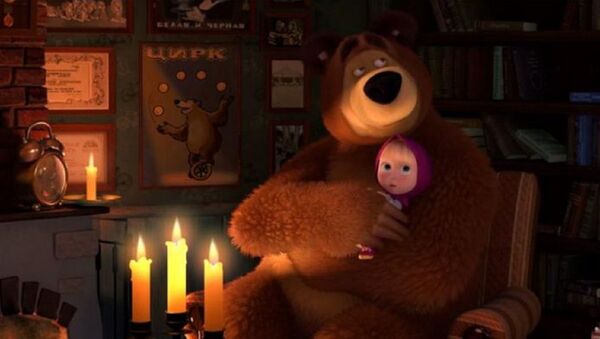But it's not Russia that was exposed. It's the British — and by extension the rest of Western media and their outlandish anti-Russian "campaigns".
We're talking about the internationally acclaimed animation 'Masha and the Bear', which is wildly popular among children and even adults around the world. Translated from the original Russian into 36 languages, the exquisitely funny cartoon is viewed in 120 countries.
It tells the tale of a tiny mischievous girl who is befriended by a big bear and lots of other forest animals.
I'd love to win for my daughter Amy! She is my very own Masha, and she absolutely loves to watch Masha and the bear 🐻 (shhh don't tell anyone, but I love to watch it too 😎) pic.twitter.com/MqTypN7NRB
— Jen Russon (@jen_russon) November 16, 2018
Yet here we have the London Times and other British media outlets publishing articles this week that — seriously, not tongue-in-cheek — claim the cartoon is "soft propaganda" for the Kremlin to "subvert children".
READ MORE: Beyond the Bounds of Reality: Cartoon 'Masha and the Bear' Kremlin Propaganda?
The Daily Mail says the animation, which is based on Russian folklore, has "drawn the ire of intellectuals in Russia's bordering states". That's because the cartoon "places a positive image of Russia in children's minds".
How dare the Russians do that! A positive image? Maybe Russia should burn all its famous literary works, turn the Kremlin palace into rubble and never, ever hold the football World Cup again.
One of the "intellectuals" cited is a Professor Anthony Glees from Buckingham University, in England, who describes the little girl character in the cartoon, Masha, as being "Putinesque" because she is "plucky and feisty".
READ MORE: British Media Ridiculed for Billing 'Masha and the Bear' Kremlin Soft Power
The British media reports were lambasted by the Russian embassy as "pathological Russophobia".
An important issue raised by @thetimes today: How UK can find salvation from “Masha and the Bear”? Launch an Ant-Cartoon Excellence Centre somewhere in the Baltic? Place all cartoonists on EU sanction list? Clearly a decisive – and a very expensive – approach is needed! pic.twitter.com/a05fKE24Be
— Russian Embassy, UK (@RussianEmbassy) November 17, 2018
The Moscow-based producer of the cartoon said it was difficult to muster a serious comment, but with a touch of irony, thanked the British media for free advertising given to their show which will no doubt boost its worldwide following even more. For the record, the producer company, Animaccord, is listed as an independent Moscow-based business — which is not funded by the Russian state.
It is easy enough to laugh off this absurd media pickle. Nevertheless, there are reasons to be thankful that such derisory views were aired. If the British press can stoop so low as to accuse Russia of using a children's cartoon as propaganda, then that is actually a good thing. For it demonstrates just how deep the psychosis of Russophobia in the official Western mind is. All the more so because such an absurd claim is published by the supposedly esteemed London Times.
If such people can somehow perceive Kremlin malfeasance in a wonderfully innocent cartoon then they have no credibility in the many other instances they claim of Russian "malign influence".
'Masha and The Bear' is child's play Russophobia. A bit more serious is the Russophobia displayed by other media reports of Moscow allegedly interfering in elections, hacking into electricity grids, poisoning former spies, threatening Europe with invasion, or ready to start World War III with hypersonic missiles.
Just this week we saw two examples of this "Russophobia for adults". The first was the debacle in electing the new chief of Interpol, the international police agency. Western media ran sensational reports that the "Kremlin was trying to take over Interpol" because the organization's current deputy chief Alexander Prokopchuk was a candidate for the presidency. In the end, a South Korean candidate was elected as the new Interpol president instead of Prokopchuk.
READ MORE: Moscow Regrets US Defamation Campaign in Interpol Election — Foreign Ministry
The Western media hysteria over a Russian national becoming head of Interpol was no doubt partly why his election was blocked. One suspects that the real objection was because if Prokopchuk had been elected to head the international crime agency, such a move would have made a mockery of the long-running Western media campaign to isolate and criminalize Russia. To justify interfering in the Interpol election, US and British officials — with the help of their news media — then created a bogeyman story that the Kremlin was "taking over Interpol".
The other "Russophobia for adults" was the passing away this week of Igor Korobov, the former head of Russia's military intelligence agency, GRU. Korobov died from a long-term illness. Yet Western media and a posse of pundits immediately rushed to peddle all sorts of wild conspiracy stories that he had been assassinated by the Kremlin. It's not worth even dignifying the febrile claims with their alleged details.
However, the point is that while Russia is roundly and relentlessly accused of propagating propaganda and influence campaigns to "subvert Western minds", the far more urgent reality is that it is Western politicians, think-tanks, academics and media who are the serial propagandists.
Western propaganda dressed up as "news" is so replete, so systematic, so structural, that it is all-dominating and almost impossible to discern, so saturating and prevalent is it. It's a matrix of mind control.
The Western media with self-important claims of "independence" and "news can you trust" are the biggest, most brazen purveyors of propaganda, from distorting the wars in Syria to Yemen, to concealing the involvement of their governments in sponsoring terrorism, to never explaining to their public about why poverty, exploitation and social deprivation are such shameful and unacceptable abominations.
Western media never tell their public about the reckless warmongering of their governments towards Russia, China, Iran and other "foreign enemies".
But, indirectly, the charade of misinformation and indoctrination fell apart this week when the London Times and others took the Russophobia beyond the pale — and targeted 'Masha and the Bear'.
For that absurdity, we can be thankful. Not only have the British media given the Russian cartoon free advertising. They have also exposed their endemic Russophobia in all its forms as infantile.
The views and opinions expressed by the contributor do not necessarily reflect those of Sputnik.


